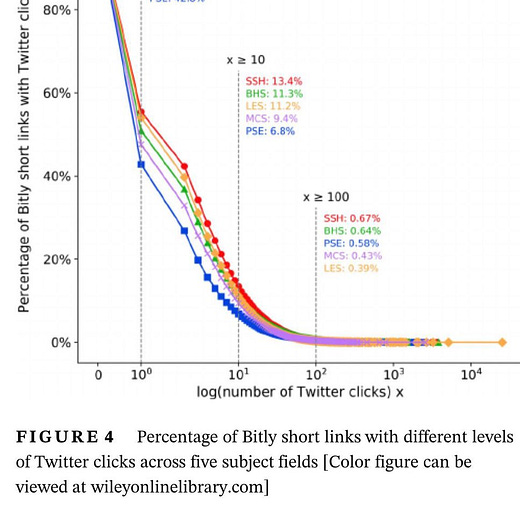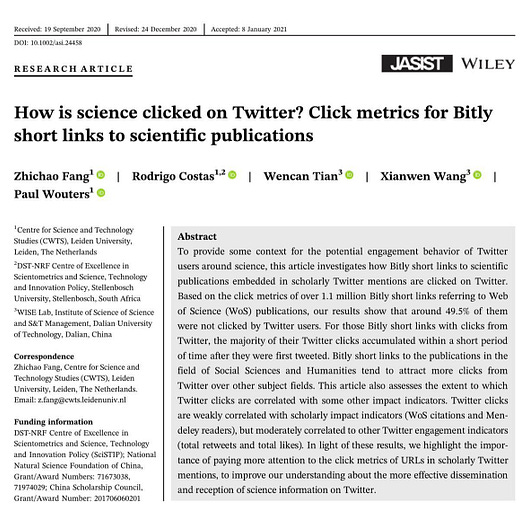Best of #econtwitter - Week of September 4, 2022 [3/3]
Sep 06, 2022
Welcome readers old and new to this week’s edition of Best of Econtwitter. Please submit suggestions — very much including your own work! — over email or on Twitter @just_economics.
This is part three of three.
Paper summaries

Science of Science@MishaTeplitskiy
🚨 Should conferences be in-person or virtual or...? 🚨
Many factors to consider, especially: how effective is each modality for learning?
New paper with @park_soya @ProfNeilT @karger shows that academics learn a LOT at in-person conferences!
arxiv.org/abs/2209.01175
1/n

1:31 AM · Sep 5, 2022
45 Reposts · 139 Likes

Science of Science@MishaTeplitskiy
Using schedules of 1960 users at 20 C.S. conferences over 6 years and taking citing a presented paper as proxy for learning, we find that papers with scheduling conflicts are cited a LOT less
5/n

1:44 AM · Sep 5, 2022
4 Likes

Ina Ganguli 🇺🇦 🌻@inaganguli
Our paper on what PhD students expect about the academic job market - and how providing information can impact their beliefs - is now up at the Journal of Economic Behavior & Organization:
sciencedirect.com/science/articl…
Thanks to @k_langin for covering it today in @ScienceCareers! 1/6

Katie Langin @k_langin
As a #PhD student, I had no idea how many graduates went on to nonacademic careers. That seems to be changing as more programs collect data. But knowing the numbers isn't enough, a new study suggests.
My latest for @ScienceCareers. #AcademicTwitter
https://t.co/MCNx0dNmU1
7:31 PM · Sep 1, 2022
9 Reposts · 48 Likes

Pietro Santoleri@santpietro
Glad to report that this is now out in @restatjournal
👉doi.org/10.1162/rest_a…
Short 🧵 👇

11:39 AM · Sep 2, 2022
23 Reposts · 82 Likes

Science of Science@MishaTeplitskiy
🚨 Reducing status bias in peer review 🚨
Double-anonymous peer review helps reduce bias, but most journals don't use it because it's laborious to enforce, change is hard, etc. Can we get bias-reduction simply by *encouraging* anonymization?
Yes!
(1/n)
papers.ssrn.com/sol3/papers.cf…

3:01 PM · Aug 30, 2022
19 Reposts · 65 Likes

Science of Science@MishaTeplitskiy
6/n
Ultimately, ACCEPTANCE RATES of low-status lead authors increased, and middle/high decreased

3:16 PM · Aug 30, 2022
4 Likes

Ethan Mollick@emollick
Very few people read the actual papers in tweets*
*Unless they hate the conclusion, in which case, I find people will skim the paper to find one thing they think is wrong (often a result of misunderstanding the methods) and & declare the whole paper dumb. asistdl.onlinelibrary.wiley.com/doi/full/10.10…


2:27 AM · Aug 29, 2022
71 Reposts · 493 Likes

Joel Waldfogel@JWaldfogel
New WP w/ @ReimersImke about the digital challenge to public libraries. A little background: libraries are huge information sources, accounting for the majority of US book consumption. 1/n
nber.org
The First Sale Doctrine and the Digital Challenge to Public Libraries

11:27 AM · Aug 29, 2022
15 Reposts · 53 Likes
More: HCI for eliciting beliefs; standards; RCV; college admissions screening; PE and health care; SCC; school fees
Interesting discussions

Paul Novosad@paulnovosad
An R&R resubmission where there are 100 pages of responses to the referees, but nothing substantive in the paper is changed.
What a waste of time for everyone involved.
Sadly, this is my modal experience when refereeing R&Rs.
4:27 PM · Aug 29, 2022
15 Reposts · 248 Likes

Paul Novosad@paulnovosad
The fault is not with the authors, it's with the rules of the game where this is equilibrium behavior.
4:31 PM · Aug 29, 2022
16 Likes

Paul Novosad@paulnovosad
Here's a simpler, better system:
1. An R&R is a commitment to publish the paper
2. The referees get to write a "limitations" section that comes after the introduction
4:31 PM · Aug 29, 2022
13 Reposts · 134 Likes

Paul Novosad@paulnovosad
It's incentive-compatible — if you disregard the referee comments, readers get to understand the referees' perspective and judge for themselves.
If referees are excessively mean, readers can also judge.
4:33 PM · Aug 29, 2022
40 Likes
^pair with: the new Aletheia journal linked in part 1 this week

Paul Novosad@paulnovosad
Contrast with the limitations section of current econ articles:
"There are no limitations (see Appendix pages 56–112)."
4:39 PM · Aug 29, 2022
46 Likes

Davis Kedrosky@dkedrosky
The top 5 papers (and some books) assigned in economics classes since 1990, thanks to @opensyllabus (ht @emollick).
AJR win by a pretty big margin, followed by Mankiw-Romer-Weil, Coase, and "The Tragedy of the Commons."

2:17 AM · Sep 5, 2022
127 Reposts · 687 Likes

Justin Wolfers@JustinWolfers
It's the first day of class for my Econ 101 students, and I'm wondering: If you've been in their shoes, what advice do you wish you had been given at a similar point in time?

Justin Wolfers @JustinWolfers
It's the first day of class at @umich, and as I'm looking forward to meeting my new Econ 101 students, I thought it might be timely to repost this for incoming econ students everywhere: https://t.co/gA8miyInJr #teachecon
1:02 PM · Aug 29, 2022
6 Reposts · 74 Likes

Stephen Nuñez@socio_steve
@JustinWolfers "the map is not the territory" and "this might not even be the right map"
1:11 PM · Aug 29, 2022
1 Repost · 7 Likes

